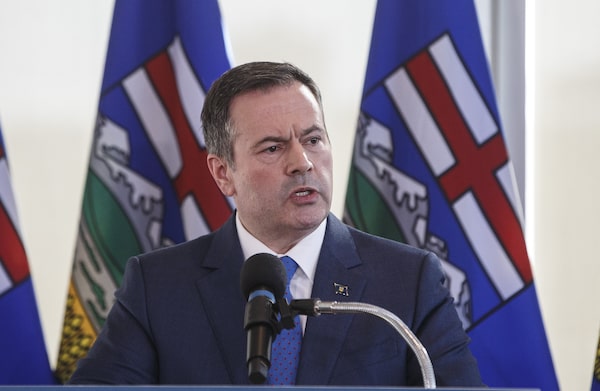
Rather than trying to inflame the situation, Premier Jason Kenney, seen here on Feb. 24, 2020, would better serve Albertans by toning down the rhetoric.JASON FRANSON/The Canadian Press
Two decades ago, after the federal Liberals won a third consecutive majority, a group of aggrieved Albertans led by Stephen Harper called for “firewalls” around the province to guard against intrusions from Ottawa.
The demands included replacing the Canada Pension Plan with an Alberta-only version, and ditching the Royal Canadian Mounted Police for a provincial force.
Those ideas faded when another oil boom arrived. But after Mr. Harper became prime minister in 2006, he made some Alberta-friendly fiscal changes. He rethought how health funding is distributed from Ottawa to the provinces – it’s now on a strict per capita basis. He also changed the formula that calculates equalization, the constitutionally mandated program that sends federal support to lower-income provinces, and capped the size of the equalization pool.
The big winner from all of that, according to the Parliamentary Budget Officer, was Alberta. By 2019-20, federal transfers to Alberta were $9.1-billion, close to triple the level of the mid-2000s, before Mr. Harper took office.
Last fall, however, with the federal Liberals back in power, Alberta was once more aggrieved and feeling short-changed. Oil prices were down, pipelines were in limbo, and Premier Jason Kenney, a long-time senior minister in the Harper cabinet, demanded a “fair deal” from Ottawa. He established a panel to lay out grievances and offer up ideas.
The report landed last week, and it is filled with new renditions of familiar songs. In his official response to his panel, Mr. Kenney said “feelings of frustration, anger and fear” are alive and well in Alberta. That is true, though he did not mention that he is feeding those feelings.
Among the panel’s ideas are those old chestnuts: a provincial pension plan and a provincial police force. It’s odd that the panel backed these, since its own polling shows a solid majority of Albertans opposed.
Other demands include the House of Commons moving to a stricter representation-by-population. Alberta would gain five seats. The province has a legitimate beef here, and it’s one shared by British Columbia and Ontario, which would gain three and seven seats.
But thanks to a redistribution of seats late in the Harper government, the House of Commons is fairer than ever to big provinces. It’s already close to rep-by-pop – and getting any closer would mean taking away seats from smaller provinces, such as Saskatchewan and Manitoba, and would in some cases require constitutional amendments.
The central demand is another old one: equalization.
When Mr. Kenney campaigned to become premier last year, he promised a referendum on the subject. The panel calls for the ballot question to be the removal of equalization from the Constitution. The referendum, set for next year, is of course pantomime. Whatever the result, the Constitution will not change, since that would require the backing of Ottawa and the other provinces.
Even so, Mr. Kenney fans the flames of anger in Alberta, stoking the belief that the province is being cheated. Reality is more complex. The panel itself notes: “Provincial governments do not contribute financially to [equalization] and the regime does not affect their ability to raise tax revenues.”
The reason it looks to some people that Alberta contributes so much to equalization, and to federal programs in general, is because individual Albertans have long had higher incomes than their fellow Canadians. In 2018, even after a decline during the long oil bust, Alberta’s median after-tax income was $72,700. Ontario was a distant second at $66,200. The national figure was $61,400. Albertans are like a family that, due to a higher income, pays more income tax than their neighbours. It’s that simple.
Aggravation over equalization is a national pastime, played for personal gain by various provinces at different times. In Alberta, it’s a bipartisan sport. The previous NDP government claimed the program “doesn’t work for Alberta.” But Mr. Kenney wields this resentment as a weapon, playing to the base of his United Conservative Party. His panel leaned in to the incendiary, demanding action or else “support for secession will only grow.”
Rather than trying to inflame the situation, Mr. Kenney would better serve Albertans by toning down the rhetoric. Can Ottawa consider modifications to the equalization formula? Yes. But entirely ditching the program is, as everyone knows, legally, politically and constitutionally impossible.
Keep your Opinions sharp and informed. Get the Opinion newsletter. Sign up today.